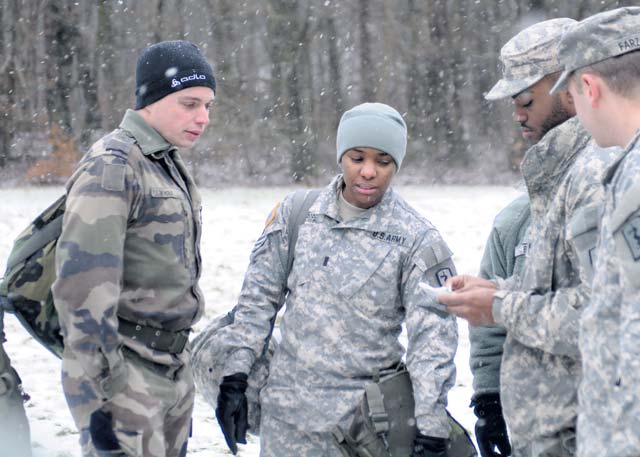
Throughout the 21st Theater Sustainment Command, French army cadets from the French Combined Armed School have been shadowing young officers as a part of an English language utilization and orientation visit designed to enhance linguistic skills and provide cadets with their first operational contact with U.S. allies.
Cadets with the Combined Armed School participate in a two-year program designed to help former military members gain a commission within the French army. One such cadet, French army 2nd Lt. Vivien Mole, is participating in the language program as he works alongside officers and Soldiers from the 30th Medical Brigade’s 212th Combat Support Hospital.
“We sponsor cadets throughout the year, and it’s special for (Mole), because he’s from a foreign service,” said 1st Lt. Amanda Kress, executive officer for Alpha Company, 212th CSH.
Programs such as these are “important, because we get to foster young cadets and influence them in a way that will help them in their future,” Kress said.
The program is designed to help foreign officers with language training, however it also serves to highlight the various differences on how partner nations’ militaries conduct operations.
“The main purpose for being here has been for English training,” Mole said. “It’s also given me the opportunity to learn platoon-leading skills, as well as learn how other armies work.
“It’s been very interesting, because I have been able to see how we do things the same way as well as how we do things differently,” he continued.
One of the differences Mole noticed was how the U.S. Army utilizes both a commanding officer and a senior noncommissioned officer to create a “command team,” a unique approach not found in the French army.
During his time with the 212th CSH, Mole has spent time with leaders at multiple levels and has been learning the differences in how each individual leader works and operates.
“He’s had the opportunity to learn a lot of leadership qualities from shadowing different people,” Kress said. “Everyone has a different leadership style, and he’s been able to shadow executive officers, people within the various shops, and he’s also been in the weeds with the NCOs, watching them and learning from their leadership styles.”
On top of passing along leadership skills and knowledge, members of the 212th CSH have enjoyed the opportunity to show off their profession to a foreign soldier.
“He got to experience going through the (the chemical warfare trainer) and conducting (land navigation), as well as setting up an internalization of a hospital,” Kress said. “He’s pretty much covered all of the basics for this unit.
“Everyone’s been really receptive to him, and they like having him around,” she added. “They all like sharing what they do with him.”
One of the most important aspects of the program is the continuation of building on the relationships with partner nations. While maintaining strong relationships with allies has always been a priority for the U.S. Army, recent world events have prompted a renewed emphasis on the NATO Alliance.
“It’s important because it’s very difficult for a single country to do everything alone,” Mole said. “You may be able to conduct small operations by yourself, but if you want to conduct lasting operations, you have to cooperate with other countries.”
“It’s important for us to maintain good relationships with our allies, and I think this is a good environment to foster that,” Kress added. “I think it makes us stronger as allies.”







